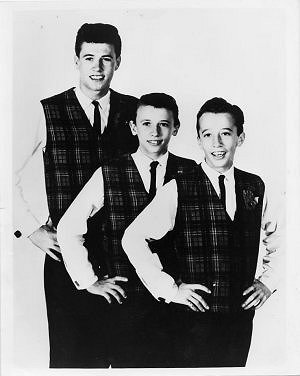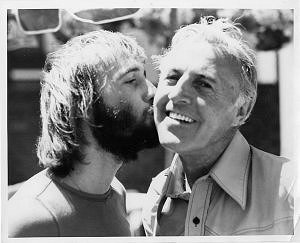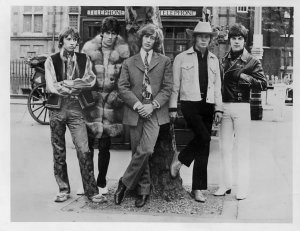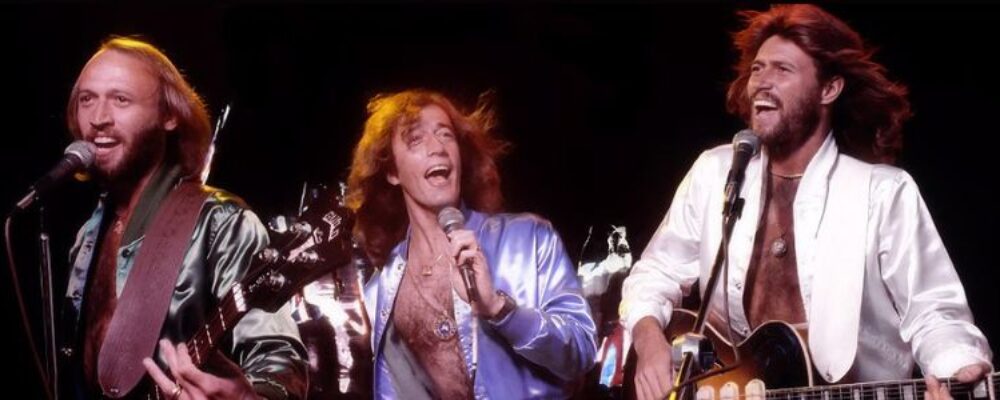Legends : Bee Gees

Copyright 1999. VH1 incorporated
Transcription Copyright 2002 by Janel Clayton Miller.
SEGMENT 1:
MAURICE: We are the Bee Gees.
MAURICE: I’m Maurice.
ROBIN: And I’m Robin.
BARRY: And I’m Barry.
NARRATOR: The story of the Bee Gees is one of the most unusual in the history of pop music. Barry, Robin, and Maurice Gibb have written more hit songs, sold more records and achieved greater heights than almost anyone else in rock and roll. They have been counted out and come back again and again. And yet the Bee Gees have never been given a free ride. They are, as Barry Gibb said, ‘the enigma with a stigma’. They have been loved passionately and forgotten, celebrated and reviled, won every honor and then seen their records publicly burned. Yet the Bee Gees have outlasted all of their detractors. On the surface the Gibb brothers seem like three of the most easy-going guys in the world. But no one in pop music has ever been more driven. The Bee Gees are legends. This is their story.
CLIP OF “JIVE TALKIN'”, SUNG BY THE BEE GEES PLAYS: “JIVE TALKIN'”, YOU’RE TELLIN’ ME LIES YEAH, GOOD LOVIN’, STILL GETS IN MY EYES.” Gees, their music and the people behind that music became an even more important part of my life than they already had become the moment I became Bee Gees fan which was in 1967 / 1968. 30 years later on January 12th just before I thought to be celebrating my first meeting with you and your family, again my life changed completely. Your so sudden death shocked me immensely and I still cannot believe what happened. Mo, one of the Bee Gees, one of those beloved brothers died. Maurice I’ve met you so often and each time was such a joy!! I’ll never forget all these precious meetings with you. All those moments you, with your brothers, again took some time to be with your fans I think for instance of that very first concert when I was proudly sitting in the London Festival Hall with tears in my eyes and with goose pimples of the emotions I felt. The day I first met you with your new girlfriend Yvonne, at your parents’ house. The time we spend an evening watching all those home made films with your family. The several evenings we went out to a bar and you, like a gentleman, drove us back to the hotel afterwards. The day you and Yvonne proudly showed us your baby boy at your house. Those many times we spend hours chatting and laughing with friends and family after another successful Bee Gees concert…..
CLIP OF “JIVE TALKIN'”, SUNG BY THE BEE GEES PLAYS: “JIVE TALKIN'”, YOU’RE TELLIN’ ME LIES YEAH, GOOD LOVIN’, STILL GETS IN MY EYES.”
SEGMENT 2:
NARRATOR: During World War II, Hugh Gibb was a drummer and bandleader in ballrooms around Manchester England. One night he spotted Barbara Pass from the bandstand and asked her to dance. Hugh married Barbara in May of 1944. A daughter Leslie was born the next year, and the family set off on what would become a lifetime of traveling. The Gibbs moved wherever Hugh was able to find work for his band. When they were offered a steady job at a resort hotel, the Gibbs settled on the Isle of Man. Barry Gibb was born on the island on September 1, 1946. Three years later twin boys Robin and Maurice arrived. No one knew it then, but the Bee Gees had begun. The Gibbs moved back to Manchester in 1955. The three brothers were surrounded by the sounds of their older sister’s rock and roll records.
CLIP OF “BYE, BYE, LOVE”, SUNG BY THE EVERLY BROTHERS PLAYS: “BYE BYE LOVE, BYE BYE HAPPINESS.”

ROBIN: It was in one of the empty rooms in our house, when we were little kids and we were and we were kind of imitating a record we’d heard on the radio, that we fell naturally into harmony. We were never taught music, it was just something that was in us to begin with.
NARRATOR: Barry got a guitar for Christmas when he was nine. The brothers started an act, miming to their favorite pop records.
MAURICE: We went to the movie house where there were in between the serial and the main movie, these kids used to get up and mime to pop records to things like Elvis and things and we loved to do that. But we went to the theatre and the record broke we were going to mime so the man put the microphone in front of us and said, ‘well just sing’.
CLIP OF “LOLLIPOP”, SUNG BY THE CHORDETTES AND THE MUDLARKS PLAYS: “LOLLIPOP, LOLLIPOP!”
NARRATOR: Music wasn’t their only hobby. Barry and Robin had become rowdy young boys.
BARRY: Well you know, if you see The Who’s film, is it “Quadraphenia”? It’s all black and white, it’s in the 1950’s, well that was the kind of existence that Manchester was like when we were little kids. We were on the streets until midnight, you know. And in the summers in England, it doesn’t go dark until about 11:00 at night. So kids always ran free. And we had a fantastic time. But trouble was we were always getting into trouble with the police. And I remember getting two years probation when I was about 11 years old.
NARRATOR: By 1958, the popularity of big bands had faded and Hugh was having trouble finding work. With the addition of a new baby, Andy, he had seven mouths to feed. The family looked to Australia for a new start.
BARRY: You could take your family for about ten pounds a head. Children traveled free. And you, you sailed for five weeks and you started a new life in this country called Australia. It was amazing leaving something behind not knowing if you’d ever see it again and it was amazing not actually knowing where you were going. So there was adventure in that.
NARRATOR: In Australia, Hugh found was work as a photographer in the bush country. Barry, Robin, and Maurice, began performing at a racetrack in Brisbane calling themselves “Wee” Johnny Hayes and the Blue Cats. Local DJ Bill Gates was impressed with the boys and began making tapes of them to broadcast on his radio show. He christened the group, the BG`s. In 1960, the 14-year-old Barry and 11-year-olds Maurice and Robin made their first local TV appearance.
CILPS OF SOME OLD SONGS LIKE: “TAKE HOLD OF THAT STAR”
NARRATOR: Soon the Bee Gees were performing on the vaudeville and nightclub circuit. The Bee Gees were now supporting the Gibb family. By 1961, Hugh Gibb gave up his photography job to handle his sons’ careers.
BARRY: He was our guardian. He looked after us. He took us to all the shows that we would’ve been not been able to do because we were too young.
NARRATOR: Soon the Bee Gees were performing on the vaudeville and nightclub circuit. The Bee Gees were now supporting the Gibb family. By 1961, Hugh Gibb gave up his photography job to handle his sons’ careers.
BARRY: He was our guardian. He looked after us. He took us to all the shows that we would’ve been not been able to do because we were too young.Maurice and his dad
MAURICE: My dad was a very typical Northern Manchester father, and the kind that never really show their feelings, you know, very sort of, you know never say, call you son or anything like that. But they love you, but they don’t … you know … my father used to always say to us after a show, we did a really good show, and we’d go, ‘wow, that was great, what do you think dad?’ and he’d go, ‘great audience, weren’t they?’
BARRY: We were all just looking out for each other, yeah. Everybody had a positive role to play. Mum would look after the clothes, dad would do the ironing. (( laughs )) Joking. Dad would drive the car, take us to the shows and we would do the shows and the money went to support the whole family.

CILPS OF SOME OLD SONGS LIKE: “ALEXANDERS RAGTIME BAND”
NARRATOR: The Bee Gees performed a program of songs by their father’s favorites, The Mills Brothers, along with comedy routines and novelty songs.
NARRATOR: While the Gibbs were singing standards, Barry Gibb was writing his own songs. In 1962, the brothers were signed to Festival Records, a local label. Their first single, “The Battle of the Blue & Gray”, was written by Barry. It didn’t do very well.
CLIP OF “THE BATTLE OF THE BLUE & GRAY”, SUNG BY THE BEE GEES PLAYS: “MANY HEARTS WERE BROKEN AND A LOT OF TEARS WERE SHED, THE SKY WAS BLACK AND THE BATTLEFIELD WAS RED”
NARRATOR: By 1963, all three brothers had dropped out of school to focus on their music. They continued to release singles, and the singles continued to fail.
BARRY: I think we made about seven, from seven to eleven singles that all flopped in a row. So we really found out what failure was all about before we even started. So there just didn’t seem to be, it seemed to be a track record. This is really good. I wonder how many flops in a row we can actually get. (( laughs ))
NARRATOR: In 1964, pop music was drastically changed by the Beatles. Barry, Robin, and Maurice were deeply affected.
CLIP OF “PLEASE, PLEASE ME”, SUNG BY THE BEE GEES PLAYS: “COME ON, COME ON. PLEASE ME, OH YEAH, PLEASE ME, LIKE I PLEASE YOU.”
ROBIN: When the Beatles came along they were writers. It was the first group writing and making records. They were doing everything we wanted to do, and always thought about doing. But we were very young even when the Beatles came along to exercise that kind of ambition.
NARRATOR: At a time when teenagers were taking over pop music, the Bee Gees were still performing to nightclub audiences of grownups.
CLIP OF “WINE AND WOMEN”, SUNG BY THE BEE GEES PLAYS: “WINE AND WOMEN AND SONG WILL ONLY MAKE ME SAD.”
ROBIN: It was kind of kids looking at adult type of things, but we were still too young to be accepted by teenagers even at that point.
NARRATOR: At the end of 1966, the brothers decided it was time to go home to England and try to invade the British pop scene. Letters were sent to London managers and even though they had no firm offers, the Gibb Family made preparations for their long ocean voyage.
BARRY: And Dad wasn’t very keen on coming back to England because he remembered how cold it was. And we were reaching that age where we wanted to leave the nest anyway. There was a sense of wanting to leave home, even though you didn’t want to leave home.
NARRATOR: Just as the Bee Gees were about to set sail, their last Festival single, “Spicks and Specks”, began to climb the Australian charts. By the time the Gibbs boarded their ship for England, they had the number one record in Australia. They never looked back.
CLIP OF “SPICKS AND SPECKS”, SUNG BY THE BEE GEES PLAYS: “WHERE ARE THE GIRLS I LEFT FAR BEHIND? THE SPICKS AND THE SPECKS OF THE GIRLS ON MY MIND.”
MAURICE: We wanted to be a part of that world, of the Beatles, the Mercy Boom because I think that’s where we, we’d get appreciated, you know, ’cause we’d really gone as far as we could in Australia.
BARRY: We were driven, we were kids. We knew no fear. (( laughs )) We had to go, we had to be a part of that thing in London.
NARRATOR: The Bee Gees arrived in England on February 7, 1967. A few weeks later they scored an audition with music mogul Robert Stigwood.
ROBIN: When we arrived in London we were flat broke and we remembered that we’d sent some tapes to him a few months before we left. Somehow, we got a phone call, four weeks after we arrived in London, three weeks perhaps. And um, which is quite fortunate because you know we were hungry. And um this phone call says ‘there’s a Mr. Stigwood on the line.’ And he was really interested in signing us.
NARRATOR: Stigwood liked what he heard. He signed the Gibbs to a five-year contract. The Bee Gees were about to become a part of the British pop scene they had fantasized about from the other side of the world.
CLIP OF “I CAN’T SEE NOBODY”, SUNG BY THE BEE GEES PLAYS: “I CAN’T SEE NOBODY, NOW I CAN’T SEE NOBODY, MY EYES CAN ONLY LOOK AT YOU.”
SEGMENT 3:
NARRATOR: In February of 1967, the Bee Gees returned to England from Australia with the dream of becoming British popstars. Within months, their new manager, Robert Stigwood, was making it happen.
BARRY: It was all like a fantasy come true. The place we had left earlier, was suddenly the place we wanted to be professionally.
NARRATOR: The first thing the Bee Gees needed to do was expand from a vocal trio to a proper rock band. They added two Australian musicians, Colin Peterson on drums and Vince Melouney on lead guitar.

The Brothers with Colin Peterson and Vince Melouney
CLIP OF ” IN MY OWN TIME” AND “NEW YORK MINING DISASTER 1941”, SUNG BY THE BEE GEES PLAYS: “IN THE EVENT OF SOMETHING HAPPENING TO ME. THERE IS SOMETHING I WOULD LIKE YOU ALL TO SEE.”
NARRATOR: Stigwood wanted to promote the Bee Gees’ debut as the next Beatles. Their first single was sent to American radio stations without their name on it.
CLIP OF “NEW YORK MINING DISASTER 1941”, SUNG BY THE BEE GEES PLAYS: “HAVE YOU SEEN MY WIFE, MR. JONES? DO YOU KNOW WHAT ITS LIKE ON THE OUTSIDE?”
MAURICE: It begins with a ‘B’ and finishes with an ‘S’. Who is it? is was “New York Mining Disaster” And they kept playing it and playing it. Everyone thought it was the Beatles under a different name.
NARRATOR: The trick worked. But it also led to the impression that the Bee Gees were Beatles imitators.
CLIP OF OLD BEATLES SONG SUNG BY THE BEE GEES.
MAURICE: And then “To Love Somebody” came out and they went, ‘there must be a real Bee Gees’.
CLIP OF “TO LOVE SOMEBODY”, PERFORMED BY THE BEE GEES PLAYS “OH YOU DON’T KNOW WHAT IT’S LIKE, BABY YOU DON’T KNOW WHAT IT’S LIKE. TO LOVE SOMEBODY, TO LOVE SOMEBODY.”
NARRATOR: To Love Somebody, a song written for Otis Redding, showed a more soulful side of the Bee Gees. The brothers’ strength as R & B songwriters wasn’t much needed in swinging London. But it would blossom in later years. Still teenagers, the Gibbs found themselves thrust into the height of London’s jet set, sitting face to face with the biggest stars of pop music.
MAURICE: I was going to a party at this club called the Speakeasy. And I’d never heard of it before but it was the club to be at. And the first person I met actually when I walked in was, Otis Redding, and then it was Pete Townsend, and went ‘whoa, this is getting heavy.’ And I remember looking at the stage and I heard, ‘scotch and Coke, isn’t it?’ And I turned around, it was John. (( gasps in shock )) But it was a great period for me because only two months earlier I was walking down Pitt Street in Sydney buying Beatle fan club books.
NARRATOR: In the fall of 1967, the Bee Gees had their first English number one single with “Massachusetts”.
CLIP OF “MASSACHUSETTS”, PERFORMED BY THE BEE GEES PLAYS: “FEEL I’M GOING BACK TO MASSACHUSETTS. SOMETHING’S TELLING ME I MUST GO HOME.”
End of part 1
